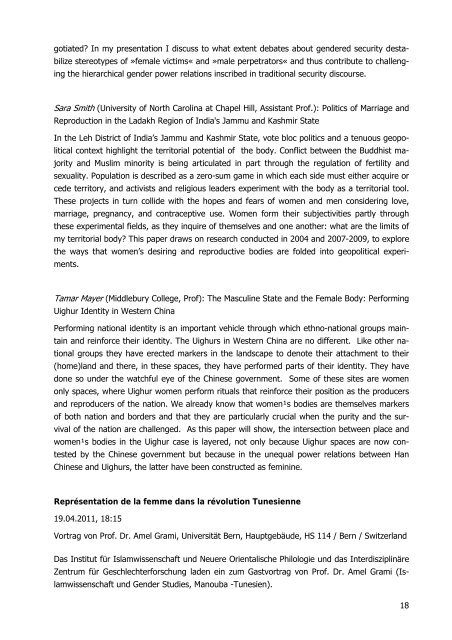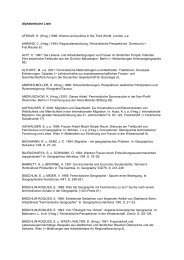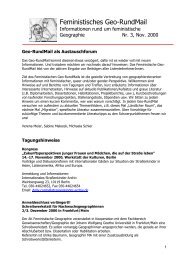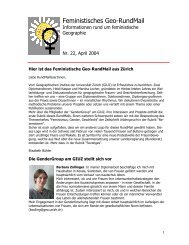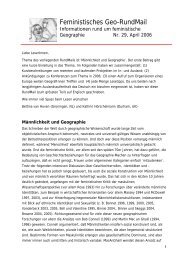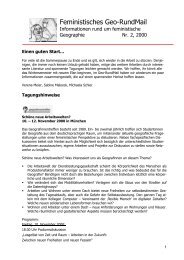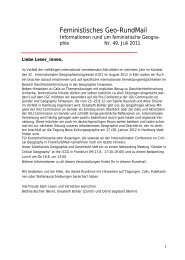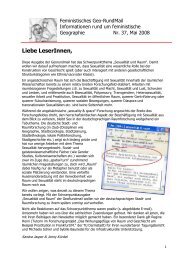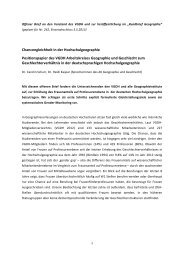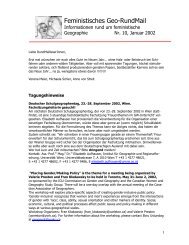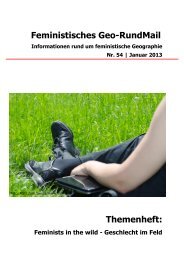Nr. 48, Mai 2011 - AK Geographie und Geschlecht
Nr. 48, Mai 2011 - AK Geographie und Geschlecht
Nr. 48, Mai 2011 - AK Geographie und Geschlecht
Sie wollen auch ein ePaper? Erhöhen Sie die Reichweite Ihrer Titel.
YUMPU macht aus Druck-PDFs automatisch weboptimierte ePaper, die Google liebt.
gotiated? In my presentation I discuss to what extent debates about gendered security destabilize<br />
stereotypes of »female victims« and »male perpetrators« and thus contribute to challenging<br />
the hierarchical gender power relations inscribed in traditional security discourse.<br />
Sara Smith (University of North Carolina at Chapel Hill, Assistant Prof.): Politics of Marriage and<br />
Reproduction in the Ladakh Region of India's Jammu and Kashmir State<br />
In the Leh District of India’s Jammu and Kashmir State, vote bloc politics and a tenuous geopolitical<br />
context highlight the territorial potential of the body. Conflict between the Buddhist majority<br />
and Muslim minority is being articulated in part through the regulation of fertility and<br />
sexuality. Population is described as a zero-sum game in which each side must either acquire or<br />
cede territory, and activists and religious leaders experiment with the body as a territorial tool.<br />
These projects in turn collide with the hopes and fears of women and men considering love,<br />
marriage, pregnancy, and contraceptive use. Women form their subjectivities partly through<br />
these experimental fields, as they inquire of themselves and one another: what are the limits of<br />
my territorial body? This paper draws on research conducted in 2004 and 2007-2009, to explore<br />
the ways that women’s desiring and reproductive bodies are folded into geopolitical experiments.<br />
Tamar Mayer (Middlebury College, Prof): The Masculine State and the Female Body: Performing<br />
Uighur Identity in Western China<br />
Performing national identity is an important vehicle through which ethno-national groups maintain<br />
and reinforce their identity. The Uighurs in Western China are no different. Like other national<br />
groups they have erected markers in the landscape to denote their attachment to their<br />
(home)land and there, in these spaces, they have performed parts of their identity. They have<br />
done so <strong>und</strong>er the watchful eye of the Chinese government. Some of these sites are women<br />
only spaces, where Uighur women perform rituals that reinforce their position as the producers<br />
and reproducers of the nation. We already know that women¹s bodies are themselves markers<br />
of both nation and borders and that they are particularly crucial when the purity and the survival<br />
of the nation are challenged. As this paper will show, the intersection between place and<br />
women¹s bodies in the Uighur case is layered, not only because Uighur spaces are now contested<br />
by the Chinese government but because in the unequal power relations between Han<br />
Chinese and Uighurs, the latter have been constructed as feminine.<br />
Représentation de la femme dans la révolution Tunesienne<br />
19.04.<strong>2011</strong>, 18:15<br />
Vortrag von Prof. Dr. Amel Grami, Universität Bern, Hauptgebäude, HS 114 / Bern / Switzerland<br />
Das Institut für Islamwissenschaft <strong>und</strong> Neuere Orientalische Philologie <strong>und</strong> das Interdisziplinäre<br />
Zentrum für <strong>Geschlecht</strong>erforschung laden ein zum Gastvortrag von Prof. Dr. Amel Grami (Islamwissenschaft<br />
<strong>und</strong> Gender Studies, Manouba -Tunesien).<br />
18


